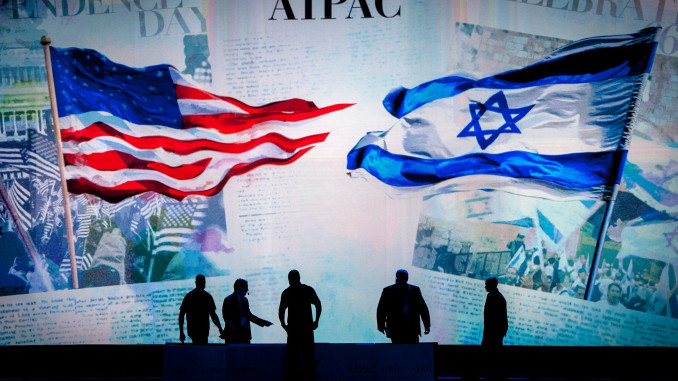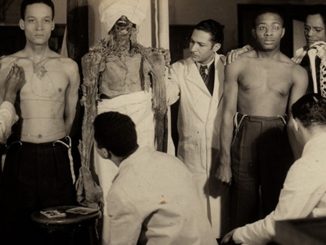
As Israel’s genocidal war against the Palestinian people proceeds with extreme brutality, the Biden administration in the U.S. has lent Israel its unconditional support. The war has gone on for six months, leaving more than 34,000 Palestinians in Gaza dead, their society shattered, and their homes obliterated. Israel has carried out this campaign of death and destruction, armed with bombs and munitions that are made in the U.S.A., and in the midst of the bloodshed the arms keep flowing. Under an Obama-era policy promising $38 billion in arms to Israel until 2026, the U.S. continues to send weapons, and Congress recently voted to add $26 billion.
Only in the most recent period, as Israel’s war threatens to ignite tensions and start a regional war, and famine sets in within Gaza’s borders, has the Biden administration begun to call for restraint or a change in Israeli policy. This opposition has only been verbal, and the U.S. has done nothing to leverage its substantial material support for Israel, even to shift its policy slightly.
Many observers ask whether the U.S. is held in thrall to Israel’s policy by its political partisans within the U.S., the so-called Israel lobby. While it is true that pro-Israel political groups wield a great deal of power and influence within U.S. politics, to place the blame solely on this phenomenon is to obscure the overall picture – U.S. support for Israel is a pillar of its imperialist policy in the Middle East, and the Israel lobby is a mechanism within U.S. politics that reinforces this policy but does not control it.
The State of Israel came into being in 1948, in a war of conquest. Between World War I and 1948, Palestine had been in the grip of the British Empire which had collaborated with Jewish nationalists –the Zionist movement – a policy which facilitated their colonization of the territory. After World War II, the British withdrew from Palestine, and the Zionist movement took the moment as an opportunity. The Zionist forces quickly bypassed the borders of a failed U.N. partition plan, one the Palestinians had refused, as it gave away more than half of the country to the Jewish colonists. Some 750,000 Palestinians were expelled or fled Palestine, leaving only 100,000 or so living within the new borders of the State of Israel. Many of the exiles became the new population of Gaza, refugees from their homeland, living on the Gaza strip under Egyptian control.
The Zionist movement had always operated through a network of agents to gather international support and political influence. This strategy was at the foundations of British support for Zionism. The Zionist leader Chaim Weizmann, operating through offices in Manchester, successfully lobbied the British to support the Zionist movement, leading to the Balfour Declaration in 1917, lending British support to the establishment of a Jewish state in Palestine.
During World War II, Zionists in the U.S. worked towards similar goals. The U.S. played second fiddle to the British in the Middle East before World War II, but after the war this dynamic shifted. The U.S. became the primary imperialist power exerting influence in the Middle East. In 1954, Zionist organizations in the U.S. came together to form the American Zionist Committee for Public Affairs. This organization, now known as the American Israel Public Affairs Committee (AIPAC), continues to this day to be the main organization that pressures Congress and addresses the public in order to ensure continuing support of the State of Israel.
U.S. support for Israel was not automatic. At first, the new state was regarded with a degree of suspicion by the imperialist powers. The Zionist movement had collaborated with the British, but had never fully been under their control. The world was split between East and West in the Cold War, and British and U.S. politicians, often fueled by anti-Semitism, pointed to the Eastern European origins of Zionism. Might they not be allies to the Soviet Union due to their origins?
However, the State of Israel proved its worth to imperialism in 1967 by delivering a defeat to Egypt’s Arab Nationalist government, which had relied on support from the USSR. Egypt was led by nationalist military officers who were motivated in part by their government’s inability to defend the Palestinians in 1948. Israel’s colonial nature set it in constant conflict with the Arab states, and this made it a natural ally of the U.S. in its goals of extending dominance over the region.
In spite of the best efforts of the Zionist lobby, U.S. support for Israel was only seven million dollars per year before 1967, a token amount. After 1967, when Israel demonstrated its utility to U.S. imperialism, that number began to rise. Today, the U.S. provides $3.8 billion in military aid per year to Israel, or 16 percent of its military budget. This burgeoning alliance of the U.S. and Israel coincided with the military occupation of the West Bank and the Gaza strip during the 1967 war.
After 1967, support for the State of Israel became an article of faith for U.S. politicians. Not only did Israel’s policy of confrontation with Arab nationalism coincide with U.S. imperial interests, Zionist organizations and especially AIPAC could bring a substantial base of support to political campaigns. This began the marriage of convenience through which AIPAC wields substantial influence in domestic U.S. politics. However, this special relationship was guided by U.S. interests in the Cold War and its imperialist interests, especially to keep the USSR from gaining a greater foothold in the Middle East. Without this convergence of interests, the Israel lobby would not be such an important factor in American politics.
AIPAC is able to put substantial money into U.S. elections, especially to try to shift races away from politicians who are critical of Israeli policy. For example, recent elections for Congress in Pennsylvania and North Carolina saw AIPAC pour millions of dollars into Democratic Party primary races where candidates are chosen, in order to stop candidates who are critical of current Israeli policy from winning. For decades, the Democratic Party has been the preferred party for AIPAC, coinciding with Israel’s projected image of a democratic, secular, progressive society. In recent years, however, pressure on the Democratic Party has led to criticism of Israel by some left-wing Democrats. At the same time, evangelical Christians, a rising force in the Republican Party since the 1980s, have come to support Israel for religious reasons. Recent AIPAC endorsements have leaned more heavily on candidates from the Republican Party, including those who supported President Trump’s attempt to disrupt the 2020 election. This has coincided with Israel’s shift to a more right-wing, nationalist profile.
AIPAC also uses its resources to influence public opinion and stifle debate. For decades, AIPAC has put together and published files on “anti-Israel” universities and professors. AIPAC also cultivates its relationship with wealthy university donors, an important source of funding for both private and public universities in the U.S. Politicians and donors put pressure on universities to discourage and outright repress criticism of Israel. AIPAC pressure has led to the denial of positions to professors, and the disciplining of student activists. During Israel’s recent war on Gaza, there has been a stifling atmosphere on U.S. college campuses as students and faculty weigh the cost of criticizing Israel and its war.
The best way to understand the Israel lobby is as a cog in the machine of U.S. politics. It provides support for politicians, mobilizes votes, generates propaganda and moral justifications, and suppresses dissent, all in defense of Israel as a key support for U.S. imperial strategy in the Middle East. However, from the start, the relationship between Israel and the U.S. and U.S. politicians and AIPAC was established based primarily on the needs of this strategy, not because of the power of the lobby itself.




